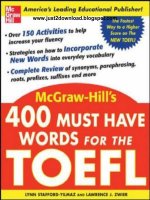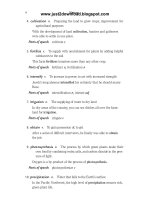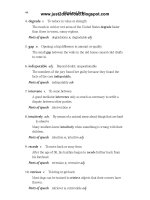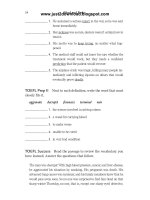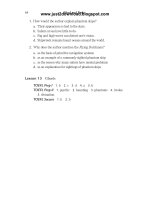The MBA Center Grammar Review for the TOEFL - part 7 ppsx
Bạn đang xem bản rút gọn của tài liệu. Xem và tải ngay bản đầy đủ của tài liệu tại đây (18.57 KB, 5 trang )
For more material and information, please visit Tai Lieu Du Hoc at
www.tailieuduhoc.org
However, this will not change the simple sentence structure, or the verb. In fact, the
sentences are identical: the second sentence only adds extra information.
Question Words in a Statement
In order to ask a question, we normally invert the subject and verb after the question word.
But when we use a question word in a statement, we normally follow it with first the subject
and then the verb. Consider these two examples:
Where is the bus stop?
I don’t know where the bus stop is.
The first sentence is a simple question, and we put the verb before the noun. The second
sentence is a statement and we follow the question word with the subject and verb. If the
sentence is not a question, make sure that the verb follows the noun.
Introductory Modifiers
Introductory modifiers are words or phrases that begin a sentence. Like all modifiers, they
must be as close as possible to the noun that they modify or describe. There are many
different kinds, but ETS is mainly concerned with the introductory verbal modifier and the
introductory adjective modifier. These modifiers can be very long, but don’t let that confuse
you. Just make sure that the subject being described is directly after the modifier.
Introductory Verbal Modifiers
This kind of modifier will use the participle or the gerund. If the subject of the action is not
mentioned in the modifier, it must follow directly after it. Always make sure that the
modifiers are describing the correct subject.
WRONG: Looking out of his window, the city looked very quiet and peaceful.
RIGHT: Looking out of his window, the man thought the city looked quiet and peaceful.
V. COMPARATIVES
Comparatives are words or expressions that contrast or relate to things in a sentence.
There are two kinds of comparatives: the simple comparative and the superlative. In
addition there are many idiomatic phrases that are comparatives.
Here we will look at the two different kinds of comparatives and the idiomatic expressions
that go with them. As with all idioms in English, to learn them they must be memorized.
The proper use of the comparative idiom is a common testing point on the
TOEFL.Comparatives
The most common type of comparative is the “-er” form or, with words of three or more
syllables, the addition of the word “more.”
“-er”
31
For more material and information, please visit Tai Lieu Du Hoc at
www.tailieuduhoc.org
We use “-er” for short words, normally one- and two-syllable words.
tall taller small smaller
smart smarter nice nicer
big bigger short shorter
light lighter heavy heavier
However, we use “more” if the word is longer.
intelligent more intelligent
sophisticated more sophisticated
interesting more interesting
frightened more frightened
essential more essential
Both the “-er” and “more” forms are used to compare two things. We can compare
subjects, objects, actions, etc. At this point you should be concerned with a “correct
comparison.” That is, when making a comparison, make sure the two things being
compared are the same kind of thing. You cannot, for example, compare “a country” with
“a leader.”
Irregular forms
Be careful of comparison words that have irregular forms.
good better (not “gooder”)
well better (not “weller”)
bad worse (not “badder”)
badly worse (not “badder”)
Idioms
With the simple comparative, we use the word “than.”
I am better than him.
This book is more interesting than that one.
The movie was longer than I expected.
Note that we can also use the word “less” in a comparative.
The dinner was less than the dinner we had had before.
The course was less informative than the one he gave before.
The book is less expensive than what the man said it would be.
And we can use the word “fewer” in the same way.
32
For more material and information, please visit Tai Lieu Du Hoc at
www.tailieuduhoc.org
There are fewer than 10,000 sperm whales still surviving.
Fewer than 200 people signed up for the advanced course.
He has fewer options than most of my friends.
Same as
This comparison describes two things which are exactly alike. Always use “as” with this
idiom.
This book is the same as last year’s edition, but it costs more!
Each movie I see seems the same as the last.
He did not receive the same TOEFL score as I.
Similar to
This comparison describes two things which are close or almost matching. Again, be
careful of the idiom.
His apartment is very similar to mine, although he has a better view.
The book is similar to last year’s, but there are more exercises.
Your coat is similar to one that I had a few years ago.
Like, Alike
These comparison words, describing two things that are almost identical, have two
different forms.
The TOEFL test is like the TOEIC test, although the latter is easier.
or
The TOEFL test and the TOEIC test are alike, although the latter is easier.
This class is like the one I took last summer in New York.
or
This class and the one I took last summer in New York are alike.
Channel 13 on regular television is like Channel 45 on cable television.
or
Channel 13 and Channel 45 are alike.
As as
Another comparison of similarity, make sure that when you use “as” in the comparison you
repeat it after the quality word (big, small, cheap, etc )
This book is as expensive as the one I bought last year.
The seats are as close as the other ones you wanted me to reserve.
The performance was as good as could be expected.
33
For more material and information, please visit Tai Lieu Du Hoc at
www.tailieuduhoc.org
I wouldn’t consider him as good a player as Smith or Jones.
“As as” can also be an expression of comparison, usually referring to a duration or
period of time.
As long as you did what you wanted to, what is there to worry about?
We will go to America as soon as we find a place to stay.
As long as you work hard, you will get your salary.
As soon as she came into the room, I knew she was the one.
Different from
Another idiom, this time comparing two things that are not the same at all. Note that
“different than” is incorrect.
Coffee in France is not very different from coffee in America.
His course was different from what I expected, but I liked it.
My idea is different from his, although I think we can use his idea as well.
Superlatives
Superlatives are the highest form of something and must be used when comparing three
or more things. Like the simple comparatives, we use “-est” for short words and words like
“most,” “least,” “best,” etc. for longer words. Look at these examples:
Mike is smarter than Fred in class, in fact he is the smartest student I have.
Paris is better than most cities, it is perhaps the best city in the world.
The New York Times recently reported that Joyce was the finest writer of the
twentieth century
Irregular forms
good better best
bad worse worst
far further furthest
Advanced Comparative Forms
Sometimes we repeat the comparative to say that something is changing continuously.
The work keeps getting harder and harder.
I find it easier and easier to find an apartment that I like.
The work on the book is becoming more and more boring.
We can also use a parallel structure form to describe actions that are connected.
The sooner I finish this work the better.
The fewer responsibilities you have the more free time you get.
The higher we climb the harder it is for me to breathe.
34
For more material and information, please visit Tai Lieu Du Hoc at
www.tailieuduhoc.org
And be careful when you quantify a comparative.
These dishes cost twice as much as they did at the other shop.
The students must often work three times as hard as normal
or
These dishes are twice as expensive as they were at the other shop.
The students must often work three times harder than normal.
VI. PREPOSITIONS
Prepositions do many things in English. We have seen them with verbs, in idiomatic
expressions, in modifiers, everywhere. There are more exceptions with prepositions than
with any other part of speech in English. Fortunately, you are not required to know them
all. As we have said about idioms, in order to truly master them, you must practice the
language in the country of origin. However, for the TOEFL, this section should help you
considerably.
Below are common problems with prepositions found on the TOEFL. Like the idioms, you
will have to memorize them.
At, On, and In
These prepositions are very common in describing a place or describing a time. Although
prepositions have a regular form, we are going to look at the advanced cases. Please be
very careful with the exceptions.
Place
At referring to a specific place
at the doctors office
at number 10 Main Street
at the corner of 5th and 17th
On referring to a general area
on the playing fields
on Main Street
on top of the building
on the side of the road
In referring to a much more general place
in Madrid
in the classroom
in the countryside
in the urban area
Consider this example:
I live at number 10 on Simon Avenue in London.
35
